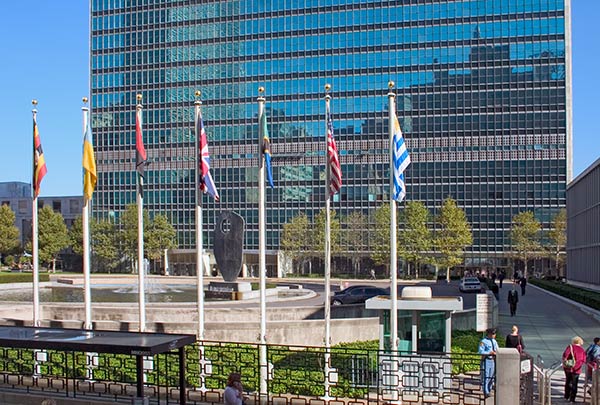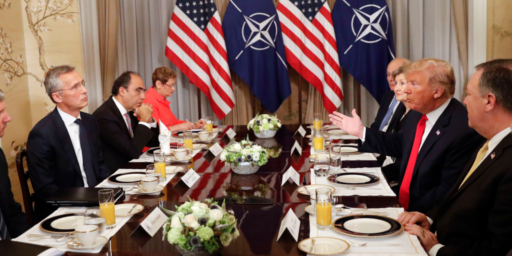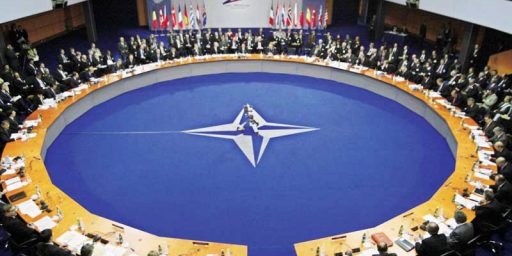Let George Do It!
 Dave Schuler wins Line of the Day honors for this comment on Alex Knapp’s post about the differences between the Clinton and Obama foreign policies:
Dave Schuler wins Line of the Day honors for this comment on Alex Knapp’s post about the differences between the Clinton and Obama foreign policies:
There’s a razor’s edge between greater reliance on international institutions and “let George do it”.
I’m personally and professionally committed to the use of international institutions, particularly NATO and various international trade regimes, as a vehicle for addressing world problems. As my boss, Fred Kempe, likes to say, “NATO won’t save the world but the world won’t be saved without NATO.”
But most politicians advocating for greater reliance on international institutions are really, as Dave suggests, trying to pass the problems off to someone else. That’s simply not feasible.
There are all manner of reasons why having NATO, the United Nations, the World Trade Organization or some other IO branding on a solution is beneficial. The United States can’t do everything by itself and there are even times when putting an American face on a problem makes it worse. Most of the time, though, American leadership — and certainly American engagement — is the sine qua non of the successful use of international institutions.






I’d like to thank the academy…
I don’t really think that’s fair. Or true, for that matter. Given that international institutions are something that most Americans are, at best, ambivalent about and at worst downright hostile towards, I think that a tendency towards internationalism among politicians today really does come from a conviction that international institutions are a superior means of solving many foreign policy issues.
Of course, as international institutions do grow stronger, no doubt domestic politicans will use them as an excuse to fob off problems (see e.g. governors complaining about having insufficient federal funds for x). In the current political climate, though, I don’t think that this is the case.
Not exactly. I think that some politicians see it as a way of passing off the problems, others as a way of doing an end-run around the necessary spade-work of convincing the American people of what needs to be done.
That latter I see as a complete exercise in futility. That UN or NATO can be valuable tools for accomplishing things we want to do I have no doubt. Their track record on compelling the American people to do things they don’t want to do is virtually nil.
Here’s my case in point. We don’t want to commit troops to Darfur. If we wanted to, we’d already have done it.
How likely do you think it is that we’ll be able to convince NATO to commit troops to Darfur without having troops there ourselves? We can barely get NATO to put troops in Afghanistan and we’ve got troops there!
Actually this thesis,
seems to be in conflict with the nobel prize winner (I know you all hate those guys) Roger B. Myerson’s conclusion: Force and Restraint in Strategic Deterrence: A Game-Theorist’s Perspective
Rather than merely being a mechanism to pass off responsibility, it’s seems to be clearly something that can increase our effectiveness.
No doubt. Again, my day job is with an organization that “promotes constructive U.S. leadership and engagement in international affairs based on the central role of the Atlantic community in meeting the international challenges of the 21st century.”
As the post says, the use of IOs is incredibly important. I just posit that many advocates of using IOs are really just hoping someone else will take care of things.
I just posit that many advocates of using IOs are really just hoping someone else will take care of things.
Perhaps. But then again, maybe they understand that institutionalized restraints on our use of force can be something incredibly useful. It seems there’s at least as much evidence for that conclusion as yours… After all, working with organizations such as the UN, etc, requires an incredible investment in time and resources. So, it doesn’t appear to be something that people are merely doing out of some knee jerk laziness. I’m sure there’s always someone you can find who does think that way, but when we’re referring to national figures who are making these suggestions and they’re the one’s who would have to be investing this time and effort, your conclusion that they simply want to pass the buck seems far less likely.
There seems to be somthing missing from this discussion, although Alex does seem to allude to it.
International organizations exist for other reasons than just as an alternative vehicle for the exercise of American power. What I sense in Dave and James’s comments are that their only concern is for how America can get its way in the world – and that international organizations can be helpful in this regard, but are often used by those who are their supporters as an excuse for not doing the domestic work necessary to build support for having America act on its own.
Although we have always used these institutions to project our vision for how the world should work, they were also established to be a mechanism for other nations to resolve thier own disputes, with their neighbors, in a formalized diplomatic context, as an alternative to the use of violence. The role of the superpower(s) is to defend the system, slap down any resort to violence, but otherwise offer only support and guidance to help the disputants to find their own solutions.
I sense that we in America are in an extended period of feeling out what exactly our role in the international community should be. We suddenly find ourselves to be the unrivaled superpower, and we are still searching for the right vision of how that position should be exploited. Facing some limits to what our power can achieve, some seem to be thinking only of how international institutions can be used to leverage that power – to make it more effective, given that we really cant shape the world on our own, to the extent that some thought we could.
The vision I see discussed here must appear to the rest of the world as an effort to mask American hegemony behind international institutions – and that is something that they could be expected to resist.
But others remain committed to the original view of the role of international institutions – that they should provide an ordered context for disputes to be resolved from the bottom up – and that the guardian superpower(s) should simply monitor the process, offering guidance and support, and intervene only when the diplomatic paths break down. This approach allows other nations to maintain their own sense of soverignity, while learning how to play well with others.
In other words, I disagree that the internationalists are merely trying to fob off on international institutions things that they are too lazy to convince the American people to do on our own. There is a real vision that the international community is the proper place for many of these issues to be addressed. We should not dispense security like welfare – with the US (with or without the UN) as the authority figure and the rest of the world passive recipients. The international order should be a place where other nations are given the opportunity to take responsibility for the resolution of their own disputes, in a context of peaceful diplomacy monitored by the superpower(s).
No, I’m merely pointing out that’s obviously the case.
We have yet another mistaking of OUGHT for IS. The UN OUGHT to be….but it IS what it is, and IS NOT effective in its chartered role. I can enumerate its failings, but won’t bother.
When over half of the membership is amoral or immoral, many utterly hostile to America, and use the UN as a way to gang up on us with block voting; and when the only power chamber is the Security Council, which has a composition made largely from a war a half century ago, with additions that are irrelevant, why should we be the largest underwriter of its flailing?
There is a continuing maneuver to use the UN to ban citizens guns worldwide; a Law of the Seas treaty that is an open ended tax law and passes control of the sea and undersea environment to that agency of the UN, with infringements on US sovereignty, The ICC that wanted to prosecute our officials, a push to give the UN an independent military force, and on and on…
It is obvious to me that as long as there are amoral and immoral nations in the world we should not give up any part of our sovereignty to an organization such as the UN.
Talk-Talk is fine, but no further under any UN authority. We do not need yet another layer of government bureaucracy and sweeping laws from such a crowd.
manning,
The General Assembly is powerless. The Security Council can do absolutely nothing without our consent.
The UN is a tool that can be used to bring order and legal process to international relations. Its failings are, in no small part, due to our lack of leadership – for the structure of the organization gives us enormous space for exercising leadership.
You can either use institutions like this to defuse conflicts and to bring other nations under the rule of law, or you can sit back and watch the world spiral out of control, and then be forced to use our military, our young men and our treasure, to clean up the mess. That seems to be your approach, and it strikes me as very foolish.
we should not give up any part of our sovereignty to an organization such as the UN.
Mannning, I know it’s like asking the wind to stop blowing, but would you please read the paper I linked to? It’s very accessible and understandable. If you were to actually read it, it would be interesting to find out why you think he’s full of it. Absent that, I’ll just have to echo Tano and say that your approach speaks more of beating your chest like a monkey rather than doing anything useful for us as a country. Foolish and brash.
It’s amusing to note that many of the “immoral” states you’re screeching about are clients of the US. And also very interesting to hear you use the word “immoral” when you’re an advocate of the use of torture.
Tano and Hal
Perhaps you have not read the spate of books on the UN that detail its many failings, notably (for one) Jeb Babbin’s “Inside the Asylum”, which, among other things, shows authoritatively how virtually all of the departments of the UN are corrupt, broken, and adamantly anti-American. The cost to us of some 7 billion dollars a year is pure “charity”, and it is being set up for a raise to a significant percentage of the GNP: 0.7 percent. Most of the 17,000 employees of the UN are paid in the 100 to 180 thousand dollars a year level, plus no tax and other perks, in order to run a hostile-to-the-US operation, totaling over 1 billion dollars a year in salaries alone.
There can be little chance of reforming the UN either, since any legislation to that effect must pass the General Assembly, which it won’t. In short, as Babbin says, the GA is broken, the Security Council is broken, and the SG office is broken.
To help America, we should wean ourselves from the UN and into a coalition of developed democratic nations that have common goals and respect for humanity, instead of riding a crippled and ever more expensive and sick horse into oblivion. Let the UN be the Talk-Talk house on a theater budget, but for effective world solutions, use this coalition of the strong and free that has been suggested by many as the right way to go.
The thought that the UN confers legitimacy to anything is truly laughable, except it seems to do so in the minds of dedicated internationalists, but not the US public at large. Perhaps the public has more common sense.
Many national representatives to the UN have stated openly that the main purpose of the UN is to control the United States, and shackle it to the whims of the UN. Many other representatives in their great wisdom don’t even consult with their governments when voting, writing or speaking officially in the UN.
Support of organizations by the UN that are fronts for terrorists is a proven fact.
Those that do want to ride this UN horse, and I see that you two do want to ride it, are simply misinformed, idealistic, and blinded internationalists that will take us into the rapidly flowing rivers of the world on the spindly legs of the UN, to our deaths by drowning.
I have not realized how the UN has diffused conflicts, rather than the US and its partners. Did the UN diffuse the Tamils in Sri Lanka? The Chechnya insurgency? The Iraq-Iran war? The Israeli-Palestine conflicts? The Vietnam war? Shall I go on? How about Darfur? They did very well there, didn’t they? How about Angola?
Somalia? No. Kosovo? No. Did the UN act in Iraq? How well has the UN done in thwarting the nuclear ambitions of Iran?
We don’t seem to be getting any payoff from UN actions in settling conflicts. We do the settling, when settling is needed. How about Oil for Food? There is a true UN cockup!
The world is not ready for an idealistic organization, to be run by far less than idealistic men from amoral institutions and nations. The Sudan running the Human Rights Commission? Sure.
As usual, mannning, you’re letting your bias speak instead of shutting it off for the 20 minutes it would have taken you to read the paper I asked you to. I’ll quote the conclusion here because it would be nice if your next comment actually attempted to deal with the issue rather than some bizarro world straw man that you’ve created in your fevered Birchian dreams
Myerson’s argument is really beside the point.
In what conflicting situation would restraint be the preferred approach? If there is a conflict somewhere, do we let it roll? Do we sit back and watch the genocides of the world, or do we act with ever-increasing force? If we are harmed by a conflict, do we use our restraint till we are further harmed? Just where does restraint come in?
Only for the US? So we tell the world that we won’t act with force until our restraint is overtaxed? Why should we use restraint if Americans are being slaughtered, or the commerce of the world is being disrupted, which in turn harms all of the smaller nations? Should we forgo preemptive war and take the first blow, the second, or third? Why? Should we come to the assistance of a small nation being overrun, such as Kuwait?
Seems to me that the certainty of a penalty would deter some conflicts in the first place, just as the death penalty deters murder (and it most certainly does deter).
Active law or rules and peace enforcement up front by such a Coalition just might be much preferable to after the fact of a conflict Talk-Talk in the UN, especially if you revere life.
A Coalition of strong and free nations would act to stop the genocides and the terror, I believe, as they would be more easily motivated to do so and more free from bureaucratic nonsense, procedural snags, and Talk-Talk for its own sake as the killing continues.
What’s hilarious here is that if you’d simply just read the paper instead of flail about aimlessly, you’d find his analysis is hardly beside the point and actually deals with precisely the issue you’re attempting to talk about. Unlike you, however, he deals with this issue with actual logic and the tools which make rational analysis of these issues possible.
But seeing as how rational analysis really isn’t your strong point, nor discussion of the actual analysis Meyerson has made, you simply continue to speak from your Birchian fever dreams.
One wonders if some people understand that “time is of essence” in conflicts.
Further, I believe that big battalions and certain resolve speak loudly in all languages. Let the diplomats present the soft side of America, the willing to help side, the foreign aid side, and the commerce side, but the world should be totally assured that we will stand up and act for what we believe is right.
Are we working to satisfy the world, or to hold to our principles? If the former, there will be no solution, because the world will never be satisfied and we will compromise ourselves.
Despite all the supposed logic, Meyerson has been forced to use assumptions, as any such analysis does.
The world, however, does not act on his assumptions, and specific conflicts have their own logic, not his, as we have found out over 200 years.
If you start an analysis with the idea to prove that restraint is a good thing, guess what? That will be the conclusion! Data and assumptions that don’t fit the preconceived notions of what is will be suitably doctored or ignored.
Since you did not answer my challenges, but chose to fall back on a self-serving paper whose logic is suspect, I understand your feel-good position, and deplore it.
Pretty clear you don’t understand what game theory is about. That would be okay, but Myerson does a pretty good job of explaining what it is and it’s fairly clear you either didn’t bother to read this or just – as usual – discarded it as irrelevant lefty nonsense that serves only to sap your purity of essence. It’s also pretty clear that you don’t understand that the paper is about the analysis of the payoffs for different strategies regarding the prisoner’s dilemma (in several forms), not about what to do in a specific conflict. So the crack you’re making about him assuming his conclusion is trivially falsifiable by even a cursory reading of the text.
As to your challenges, it’s one of the things I find the most amusing about you.
<golf clap>
Well, I was an ORSA member most likely before you were born, dear Hal, dear Hal. I know the drill fairly well, and I know how boxing in your dilemma omits too many relevant facts. If you assume that both players are rational, you have one outcome, but if one or both are not rational, the game is blown and you don’t win cleanly, which is the only option we can consider. Gaming with nukes in the offing is insane. Go read your Herman Kahn again.
We face today a number of irrational nations, and gaming such situations is dangerous at best. Sit down and identify what nation or nations are really afraid of the US. Can’t be anyone in Europe, unless Lichtenstein has gone cookoo recently. Can’t be anyone in South America, unless you would want to count the nutcase in Venezuela. Can’t be anyone in mid or lower Africa, unless they are paranoid, in which case showing them our genuflection to the UN would not serve any purpose whatsoever. Russia or China? You can’t be serious there. India? Nope! Southeast Asia? Not hardly. Indonesia? Nope. Australia or NZ? Nope. So just where ARE these nations that live in fear of the US, such that we should limit ourselves and give power over us to the UN? Do I smell a left wing meme here? Yes, I do: 1) they want us to renounce preemption; 2)they want us to back off from Iran and Iraq; 3) they want us to allow the UN to tie our hands; and, 4) they want us to stop supporting Israel. And then, there is BDS!
Well, maybe in the Middle East and upper Africa! They might feel a bit of fear, and that is a very good thing indeed. The Islamic nations are just about the only ones that might feel fear, I believe, starting with Iran and Syria, and throw in Palestine for good measure.
So this gaming approach says we should delimit ourselves mainly because of Iran and Syria, two of the worst global terror supporters, and one that is approaching nuclear weapons capabilities? One would be mad, literally out of their minds, to do that. You are trying out a gaming approach with the suicidal maniacs of Islam? Forget it!
Not one iota of our sovereignty, and not one iota of our freedom of choice should we relinquish, through the UN, to Islamic nations, or any others, for that matter. Zero. Madness!
Well, I forgot Central America. But they have been living with our power for a long, long time, and we haven’t exactly conquered them, now have we?
The US has no ambitions for an empire, and anyone that says we do is a fool or a con man. I rather favor the con man idea, since it has the potential for drawing attention and cash to the country, just to stop the chatter, or to join the crowd of mostly envious mal-wishers of the US. Was it Carter that gave away the Panama Canal? Some empire building we have practiced there. Or in the Philippines.
One must not react weakly to irrational governments or their con artists. Try gaming those two aspects!
Mannning, I’m not sure how you know our relative ages, but I suspect it’s similar to the way you know what an author states without having to read their piece or the way you know a newspaper article is biased without having read it either or the way you can school a Nobel prize winner in “gaming” without understanding anything about it.
In any event, please; continue to dig. Most illuminating.
Several points are most, ah, obvious:
1) The thread was about the utility of IOs, the UN, and NATO.
2) The rather silly and beside the point diversion was about Myerson’s piece on gaming, the idea of the US bowing to UN control, which is totally ridiculous, and the champion thereof has never heard of a Nobel prizewinner making an irrelevant or biased, leftist statement or argument! Want some examples? Linus Paulding, Einstein, and now Myerson, it seems.
3) This hal person, who writes as though he is a teenager, is given to ad hominem personal attacks rather that any true discussion or debate, plus touting his piece beyond reason.
4) Who was it that said arguing with a leftist is an exercise in futility, since the ground shifts at the slightest whim? That is true here. Time to move on and let young-acting Mr. Gaming do some more touting.
You never disappoint, I’ll give you that.